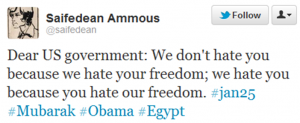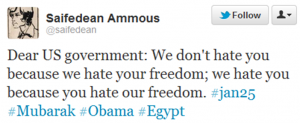As Lisa Nakamura has demonstrated in Digitizing Race and elsewhere, the fact that the rise of the internet was contemporaneous with mid-90’s neoliberal colorblind discourse has resulted in a conception of the internet as a race-free environment. However, as she also shows, at the level of people’s real use of the internet, their racial identity is a key part of how they present themselves online, whether through AIM buddies or pregnancy website avatars.
This disjuncture becomes less perplexing when this racial formation is viewed through the idea of incitement to discourse that Michel Foucault elaborates in The History of Sexuality, Volume 1. This is to say that the foreclosing of official discourses of race by neoliberalism not only didn’t make racial inequality go away (i.e. there’s still an un-level playing field), but is also “not a plain and simple imposition of silence. Rather, it was a new regime of discourses. Not any less was said about it; on the contrary. But things were said in a different way; it was different people who said them, from different points of view, and in order to obtain different results” (Foucault, 27).
Under neoliberalism, Nakamura notes in her 2009 piece Don’t Hate the Payer, Hate the Game: The Racialization of Labor in World of Warcraft, racism is “the result of the person who identifies it, for they are the ones who ‘see’ race, or ‘make the difference in their head’” (p.139). That is, it is a system in which it is assumed that if we don’t talk about race, it will go away, along with its attendant problem of racism.
The reverse side of this discourse, of course, is that “if it insisted on making itself too visible, it would be designated accordingly and would have to pay the penalty,” such that all discussion of race comes to be silenced (Foucault, 4). Nakamura terms this “the language of tolerance, or of disavowing racism by simply omitting all language referring to race,” and points out that it “functioned to perpetuate digital inequality by both concrete and symbolic means” (Nakamura 2008b, 3). (For a further discussion of neoliberal colorblindness, see Omi and Winant’s 1994 book Racial Formation in the United States: From the 1960s to the 1990s.)
However, I contend that it had a second effect—in that “the mere fact that one is speaking about it has the appearance of a deliberate transgression,” we want to speak of it more and more, to insist on these identity categories because they are denied (Foucault, 6).
The incitement to discourse does, of course, work a bit differently around race than Foucault describes it working with respect to sex; in the case of the former, it went from circulating relatively freely in unofficial contexts to being constrained there but proliferating in medical, educational, and legal official, institutional contexts.
With race, on the other hand, its official instantiation—begun, at least according to David Roediger, in 1676—fell out of favor and racial discourses proliferated instead in unofficial contexts (Roediger 2009). This is to say that, under the neoliberal colorblind model, it is imperative that we not notice race in institutional contexts, but in day-to-day practice we clearly do notice it—and in that identities get erased by the implicit whiteness of colorblind discourse, it is imperative that we do.
Thus, we are incited to racialized discourse, and, as with sex, this is not outside power but a part of the very same system that made certain phenotypic features into an essence in the first place.
In this context, then, rather than accepting the neoliberal model as producing silence, “we must try to determine the different ways of not saying such things, how those who can and those who cannot speak of them are distributed, which type of discourse is authorized, or which form of discretion is required” (Foucault, 27).
Thus, though “race” is now supposedly invisible, we can talk about insufficiently assimilated immigrant “culture” as a proxy (Nakamura 2008b, 3). Similarly, the fact that race does not exist as a category on the AIM buddy icon sites Nakamura describes does not stop the expression of racial identities; they’re just shifted off onto “nationality” (Nakamura 2008b, 44). In these ways, there is “a very rigorous expurgation of the authorized vocabulary,” but discourse proliferates unchecked (Foucault, 17).
The content of these proliferating racialized discourses makes their status as incited and not external to power even clearer. Of the pregnancy website’s avatars, Nakamura notes that “each figure is composed to look phenotypically the same in terms of facial features, yet distinct from each other in terms of skin color, hair color, and body shape”; she likens this to “the popular BeDazzler, a device that enables users to attach crystals, beads, and other trimmings to jeans or pocketbooks,” arguing that “these avatars embody an aesthetic of decoration that has to do with adornment of an existing ‘base.’ And in a sense, race is one of those aspects of adornment” (Nakamura 2008b, 144).
In this way, then, race becomes something of a fashion statement, a different-colored coating on an identical inside—like an M&M or gumball. Thus, as Nakamura argues , “while Race 1.0 was understood as socially constructed, a process that at least acknowledges that race and gender are historical formations, Race 2.0 is user-generated” (Nakamura 2008a, 1680). This user-generation promises us freedom, the ability to invent and express ourselves without boundaries, and so we eagerly take it up.
Of course, Race 2.0 isn’t a space of freedom. First, the internet may allow freedom of creation, but this is always within constraint, such that we must “view the interface as an object that compels particular sorts of identifications, investments, ideological seductions, and conscious as well as unconscious exercises of power” (Nakamura 2008b, 17).
Thus, in creating an online racialized identity, we are constrained the affordances built into (and left out of) the interface we use, as demonstrated by the simplicity of the AIM buddies. Second, the terms of race in existence in culture do not disappear when moved onto the internet; though Nakamura rightly notes that the digital divide is not a strict, either/or division, differential access to all sorts of resources is a fact of this country’s racial system, and so are stereotypes, and both factor into racial representation online (Nakamura 2008b 15, 18).
Finally, the BeDazzler-ified race performances Nakamura describes underscore the ways in which identity has become inextricable from capitalist consumerist choice. The processes Miranda Joseph (2002) describes are only intensified when enacting identity online, as race becomes something you paint on—and, thus, implicitly can take off or repaint a different color, as Nakamura’s example of Jennifer Lopez’s racial flexibility demonstrates. In this way, digital racial formation frequently works to obscure the power relations in operation with respect to race, and this, I think, should trouble us.
Works Cited
Foucault, M 1990, The History of Sexuality, Volume 1: An Introduction. (New York: Vintage).
Joseph, M 2002, Against the Romance of Community (Minneapolis: U of Minnesota P).
Nakamura, L 2008a, Cyberrace. PMLA 123(5), 1673-1682.
—– 2008b, Digitizing Race: Visual Cultures of the Internet. (Minneapolis: U of Minnesota P).
—– 2009, “Don’t Hate the Payer, Hate the Game: The Racialization of Labor in World of Warcraft”. Critical Studies in Media Communication, 26(2), 128-144.
Omi M and Winant H, 1994, Racial Formation in the United States: From the 1960s to the 1990s 2/e (New York: Routledge).
Roediger D 2009, “Hope and History: Past and Present Burdens of Race.” Center for Advanced Study Special Presentation, University of Illinois, Urbana-Champaign.


